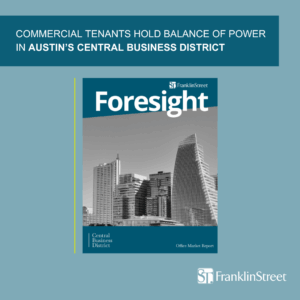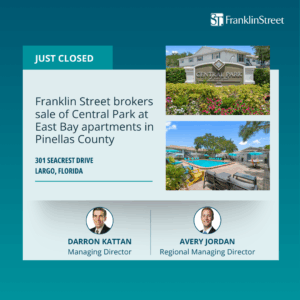Franchisees must be prepared to navigate a vastly different real estate market than they did 12 or 18 months ago.
Lack of space, ever-increasing rental rates and increased competition from corporate tenants and new concepts are squeezing franchisees out of prime locations. But franchisees can navigate these critical stages of the real estate cycle by acting fast, demonstrating value and negotiating smart terms.
As late as 2014, franchisees had many more site choices, as the country continued to recover from the recession. Now, the best locations at class A and B properties are all but gone, leaving either less-attractive sites or expensive infill redevelopments. Franchise groups exploring new developments are finding higher costs, as developers pass on increased land and construction costs down to tenants. These conditions have put rents above where they stood before the downturn.
Regardless of the concept, it is often hard to justify paying these high rents, and for franchisees, it is especially difficult. A large, corporate-backed restaurant might be able to float a location with unreasonably high occupancy costs, but a franchisee typically cannot.
Franchisees are finding themselves in greater competition for space. Quick-service restaurants, haircut concepts, cell phone stores and others are continuing to push into top markets. Corporate-owned retailers are flexing their financial muscle to outbid small, franchise groups on many of the high-priced, new development opportunities.
After the initial shock of rents and competition for locations, what should franchisees do? Understand how to shop sites, show their value to a landlord and become sharp talkers on terms.
To set themselves apart from other competitors, franchisees need to communicate how their concept will create value to both the shopping center and the landlord. What type of demographics will their concept bring to a shopping center? How will that create synergy with the other tenants? How will that make a center more competitive with the one down the block or across the highway? Painting the picture of value for landlords is more important than ever.
Sell Yourself to Your Landlord
Many franchisees have found benefit in supplying landlords with information on franchise concepts, including their track record of success. For example, if a franchise is a regional group from out-of-market, a franchisee could explain to the landlord how it would create a buzz by having the first local store in their center.
Building a hamburger chain with a dozen locations in other parts of a state and high credibility elsewhere can create excitement for a landlord that can give a franchisee an edge over other prospective tenants vying for the same space. Supplying landlords with the backgrounds on franchisees’ investors and managers – highlighting their successful track records as business owners – also can help a franchisee compete for a location. Where it makes sense, bringing together the franchisee and landlord so that they can achieve a higher level of comfort in doing business might be helpful.
While moving quickly where and when they can, franchisees also need to understand that they will need to have patience in other areas of the transaction. Occasionally, deals can take months to sign – even after the terms are agreed upon – because property owners and management companies are running lean and their decision-makers are pressed for time.
Franchisee groups need to understand this seeming paradox – they need to move fast on a planned project that may not open for a year or two.
For new construction, some franchisees tend to doubt whether a center will actually be built, a reasonable concern given the number of uncompleted projects during the last recession. They often want to wait to commit until after they can see the physical building being constructed, but typically by then, it is too late. When the developer is credible, the project is funded, and plans are working their way through the long approval process. If a franchisee waits too long, another franchise or corporate-owned concept will cut a deal.
Landlords are pushing harder for personal guarantees from franchisees in this period when they have the upper hand. In most cases, such guarantees can be limited to one or two years, made rolling instead of full-term or prevented from extending into option periods.
A franchise group also can attempt to reduce the guarantee by increasing the security deposit. For example, a franchisee could extend the guarantee up to six months as opposed to one or two months, with the deposit being returned to the tenant periodically over the term of the lease. Another solution, especially for a franchisee entity that owns multiple locations or has substantial assets, is to use a letter of credit issued from the franchisee’s bank.
How long will franchisees face these conditions? Until the supply of locations is adequate enough to meet the demand of fast-growing retail concepts. It will probably take 18 months or more for enough new retail projects to be delivered to take the pressure off occupancy rates.
For those entering a market, there will eventually be opportunities to move into a space when an existing retailer upgrades to a newly constructed center or relocates to fit a new prototype. But for those who want prime locations today, there will be a bigger concern: making the numbers work. Everyone wants to preserve their returns on an investment.
Experienced franchisees might back off when they can’t obtain the right combination of rent and property improvements. Others cannot wait, however, because of requirements found in their agreements with their franchisors. So this is a time for franchise groups to move quickly but wisely. When they find the right location, they have to grab it and be diligent to negotiate the right terms.
Brian Bern is a senior director and Samantha Berk is a director at Franklin Street, a full-service commercial real estate company based in Tampa, Fla. Both specialize in retail tenant representation. Brian can be reached at brian.bern@franklinst.com and at [email protected]



